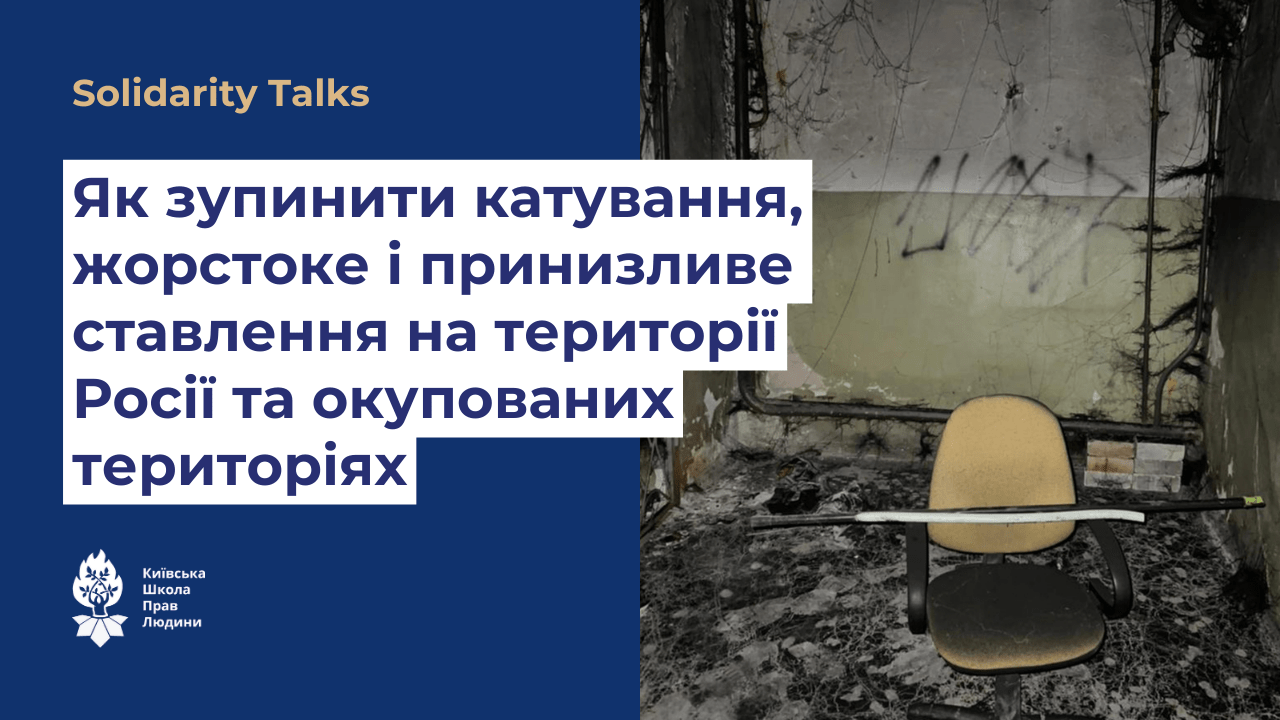How to stop torture, cruel and humiliating treatment on the occupied territories

Human rights activists from Ukraine, Russia, and European countries discussed one of the main problems of human rights violations of our time in the Solidarity Talks format. Torture and cruelty have become widespread both in the occupied territories and against Ukrainian citizens who have been taken to Russia. Dozens of special torture rooms were found in the liberated territories of Ukraine. Some torture chambers were used to hold minors. Abducted Ukrainian citizens were tortured and killed there.
Ukrainian prisoners of war and abducted civilians taken to the territory of the Russian Federation are also subjected to torture, cruel treatment, and humiliation. They are beaten on the day they arrive at a pre-trial detention center or penal colony. Russian jailers call this a “hard reception”. Abducted people are tortured with stun guns, forced to sing the Russian national anthem and other Russian songs, and are not allowed to correspond with their relatives. Torture and cruelty are part of the state policy of the Russian Federation during its aggression against Ukraine.
One of the speakers at the event, Victoria Andrusha, who spent six months in Russian detention centers and penal colonies, emphasized the systemic nature of torture, pressure, and humiliation. Their goal is to break a person psychologically.
Oleksandr Pavlichenko, Executive Director of the Ukrainian Helsinki Human Rights Union, spoke about the difficulties of protecting rights in the “vacuum zone of law” in the Russian Federation. It is important to get representatives of international organizations and neutral states to visit places of detention.
Russian lawyer Leonid Krykun states that the Russian law enforcement system does not respond to violations of human rights and laws against Ukrainian citizens, and it is necessary to find and use new tools to protect rights.
Yevhen Zakharov, director of the Kharkiv Human Rights Group, emphasized the importance of documenting crimes that may have torture as a consequence. Among such crimes is the abduction of people by the occupiers.
Iryna Biriukova, a lawyer of the Russian Public Verdict Foundation, suggested that information about the torture of Ukrainian citizens should be more actively disseminated in the Russian media. Such attention will deter torturers. In addition, it is necessary to accelerate communication between Russian lawyers and relatives of detained Ukrainian citizens in order to obtain their consent to disclose the facts of torture more quickly.
Natalia Yashchuk, coordinator of national projects at the Center for Civil Liberties, systematized the types of torture and drew attention to the facts of harm to Ukrainian prisoners of war by Russian doctors during treatment.
Sergei Babinets, head of the Russian Team Against Torture, called for more active cooperation between Ukrainian and Russian human rights defenders. Russian lawyers are not aware of all the facts of torture, so they cannot respond to them.
Oleksandra Romantsova, Executive Director of the Center of Human Rights, points out that although torture is widespread in Russian penal colonies, it is used against Ukrainian citizens in connection with the war. For example, to obtain information from prisoners of war. At the end of the discussion, its moderator, expert of the Center of Human Rights Mykhailo Savva, called the lack of patronizing countries one of the most acute humanitarian problems of this war. It is necessary to appeal to the International Committee of the Red Cross to fulfill its mission and initiate the process of appointing patron countries. Without this, the solution of many humanitarian problems is hampered.

